Festive food and drink is one of the best parts of the holiday season, but what do Brits really want to see on their Christmas dinner? Using Google search trend data and survey data, we found out the nation’s most loved and disliked Christmas foods, from time-honoured classics to items that should never be on your plate at Christmas – according to some.
The most searched-for festive foods
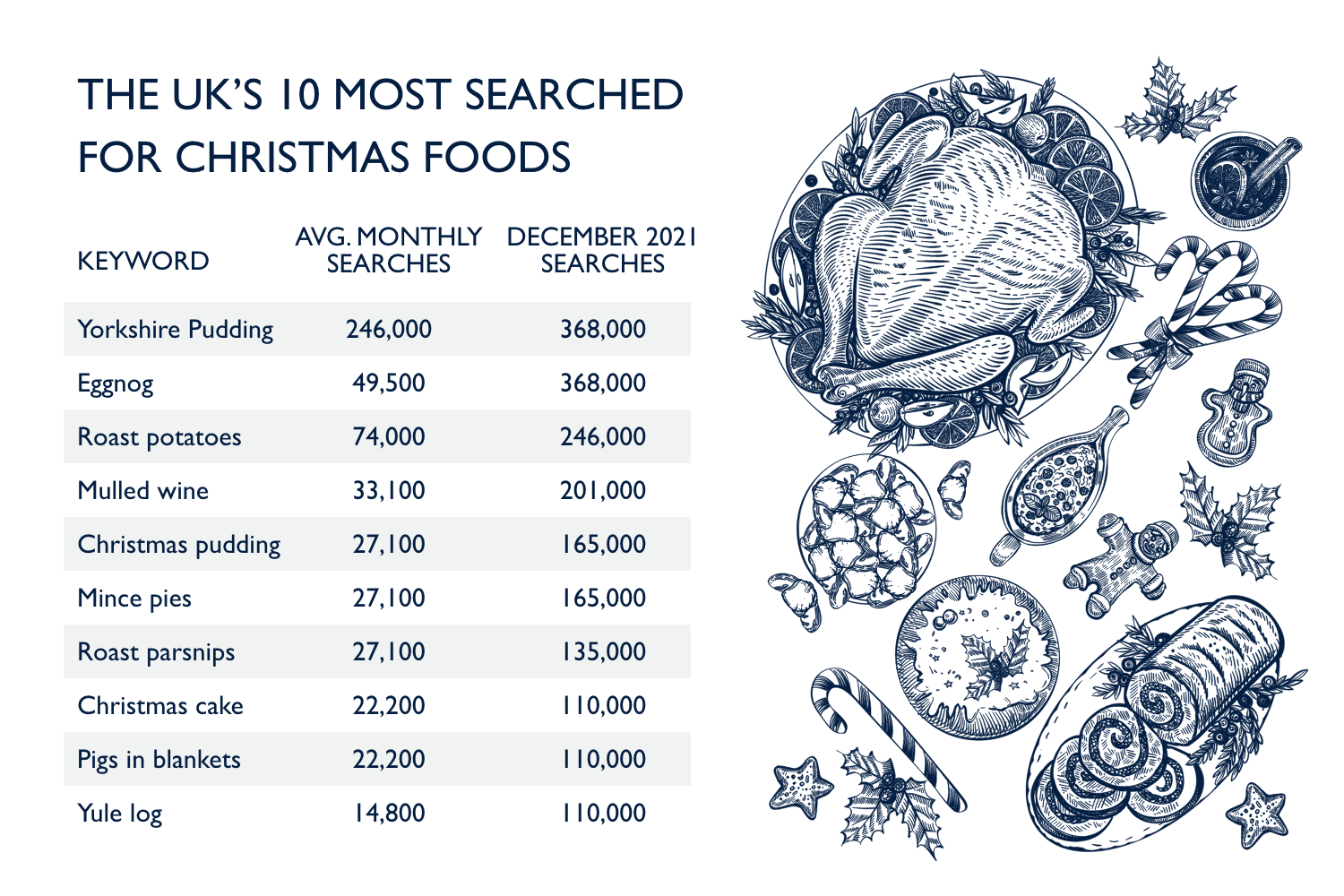
Surprisingly, the most searched-for festive food is Yorkshire puddings, despite many people saying these don’t belong on a Christmas dinner with turkey. Even more bizarrely, eggnog shares the top spot with Yorkshire puddings—both at 368,000 searches—although many people say they dislike this traditional festive drink.
Mulled wine and roast potatoes take second place, with under 250,000 searches each. Next are two of the best-known festive sweet treats: mince pies and Christmas pudding, at 165,000 searches. Christmas cake, pigs in blankets and Yule log have considerably lower searches than you might think, at just 110,000.
Which foods do we eat the most over the festive season?
In true festive fashion, turkey is the most consumed food at Christmas, with 30.95% of people eating it. Unsurprisingly, pigs in blankets (23.33%) and roast potatoes (27.81%) are next, being more popular than mince pies (21.89%), sprouts (12.34%), gravy (12.49%) and stuffing (15.32%). Despite what the search data suggests, Yorkshire puddings are the least consumed food at Christmas, at just 11.49%.
The most-disliked festive foods
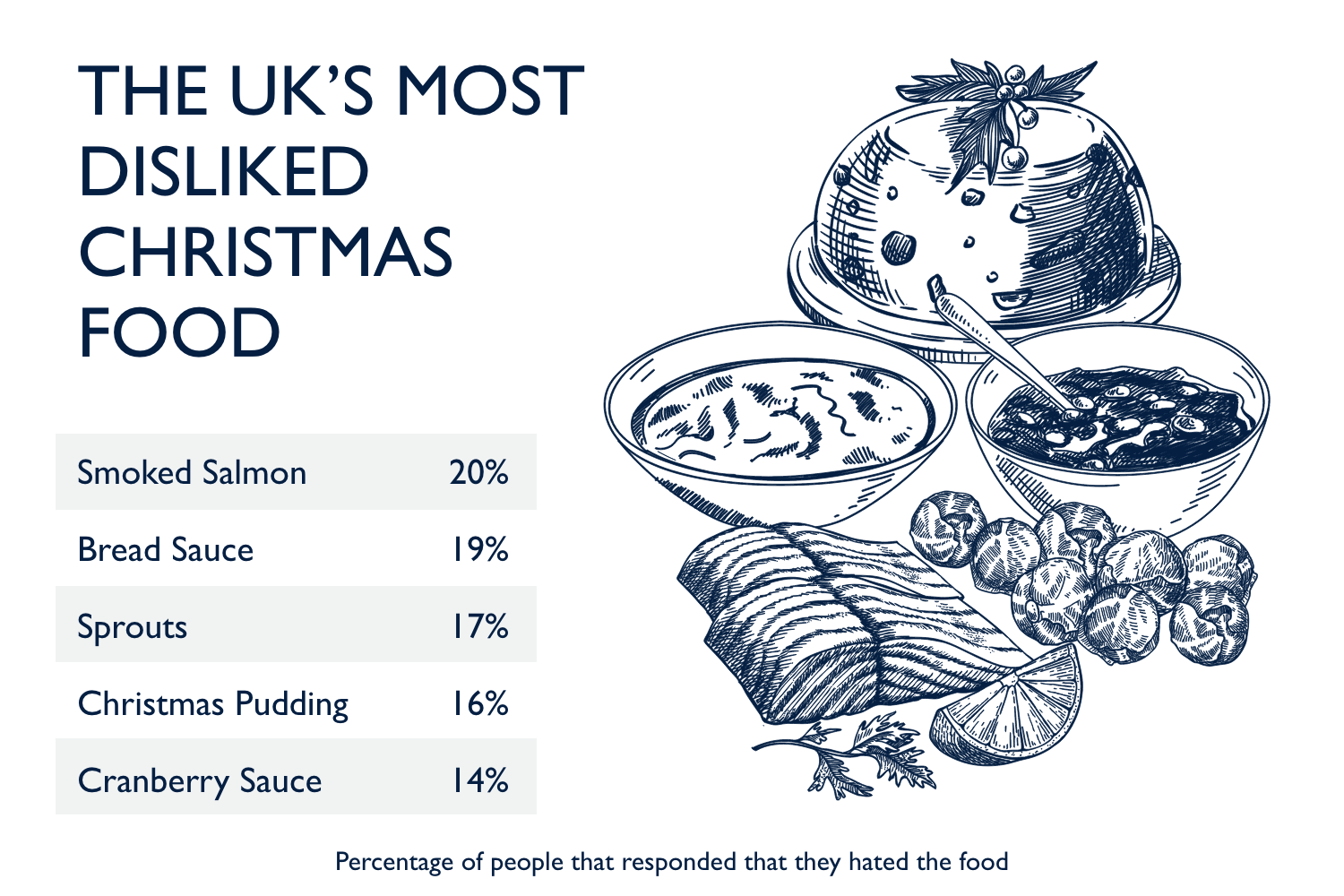
Smoked salmon is the most disliked festive food, with 20% of people saying they wouldn’t eat it. Many of the quintessential Christmas dinner trimmings are also disliked, including bread sauce (19%), sprouts (17%) and cranberry sauce (14%).
What do Brits want to remove from their Christmas dinner?
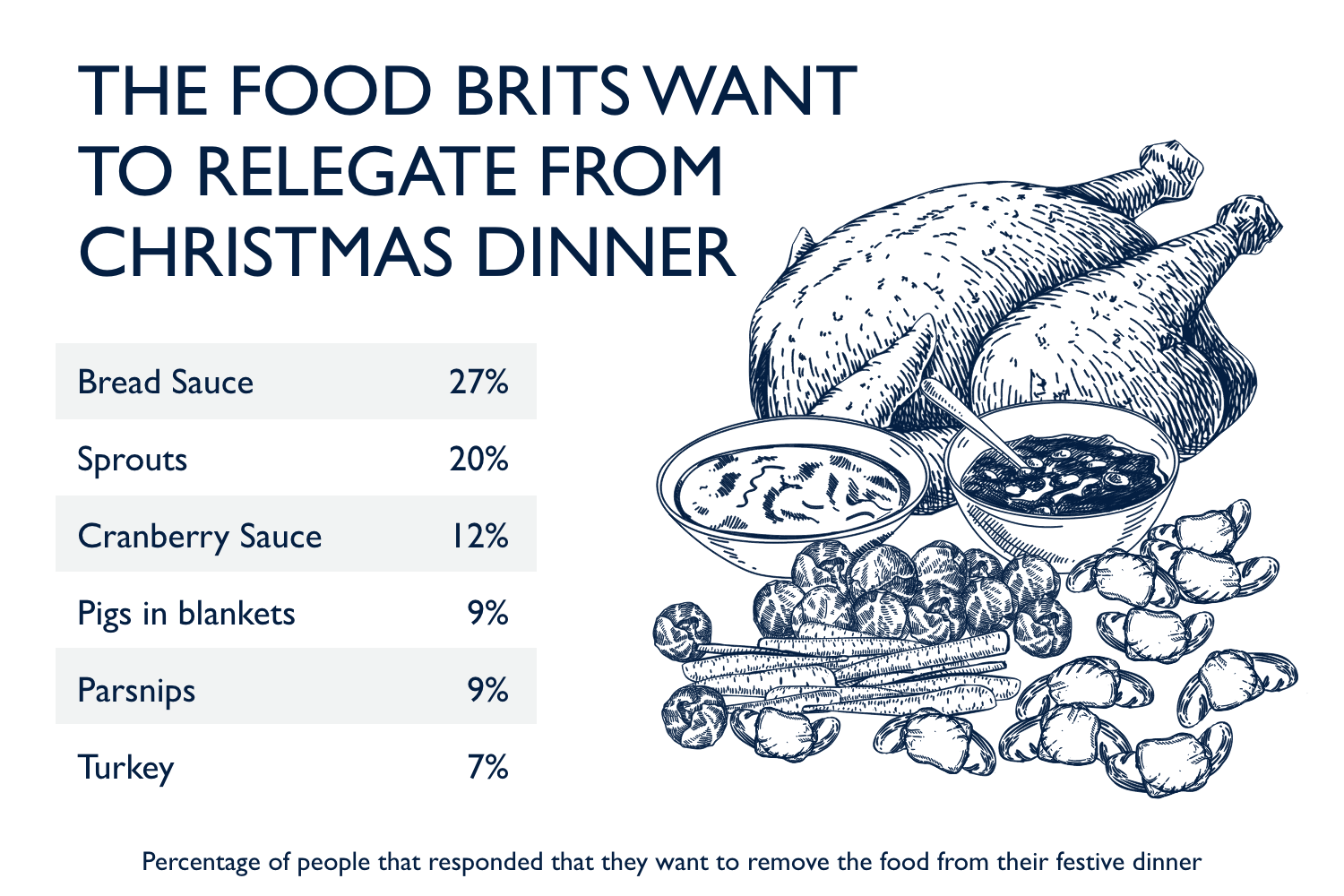
27% of Brits say they would rather not have bread sauce with their Christmas dinner, which isn’t surprising given that 19% of people said it’s their most disliked festive food. Similarly, 20% wouldn’t have sprouts, and 12% would skip the cranberry sauce. Despite it being one of the nation’s best-loved Christmas foods, 9% of people say they wouldn’t have pigs in blankets.
But what would people replace these items with? 22% said they would rather have Yorkshire puddings with their Christmas dinner, 15% would add cauliflower cheese, and 7% would have mashed potatoes.
The best-loved festive foods
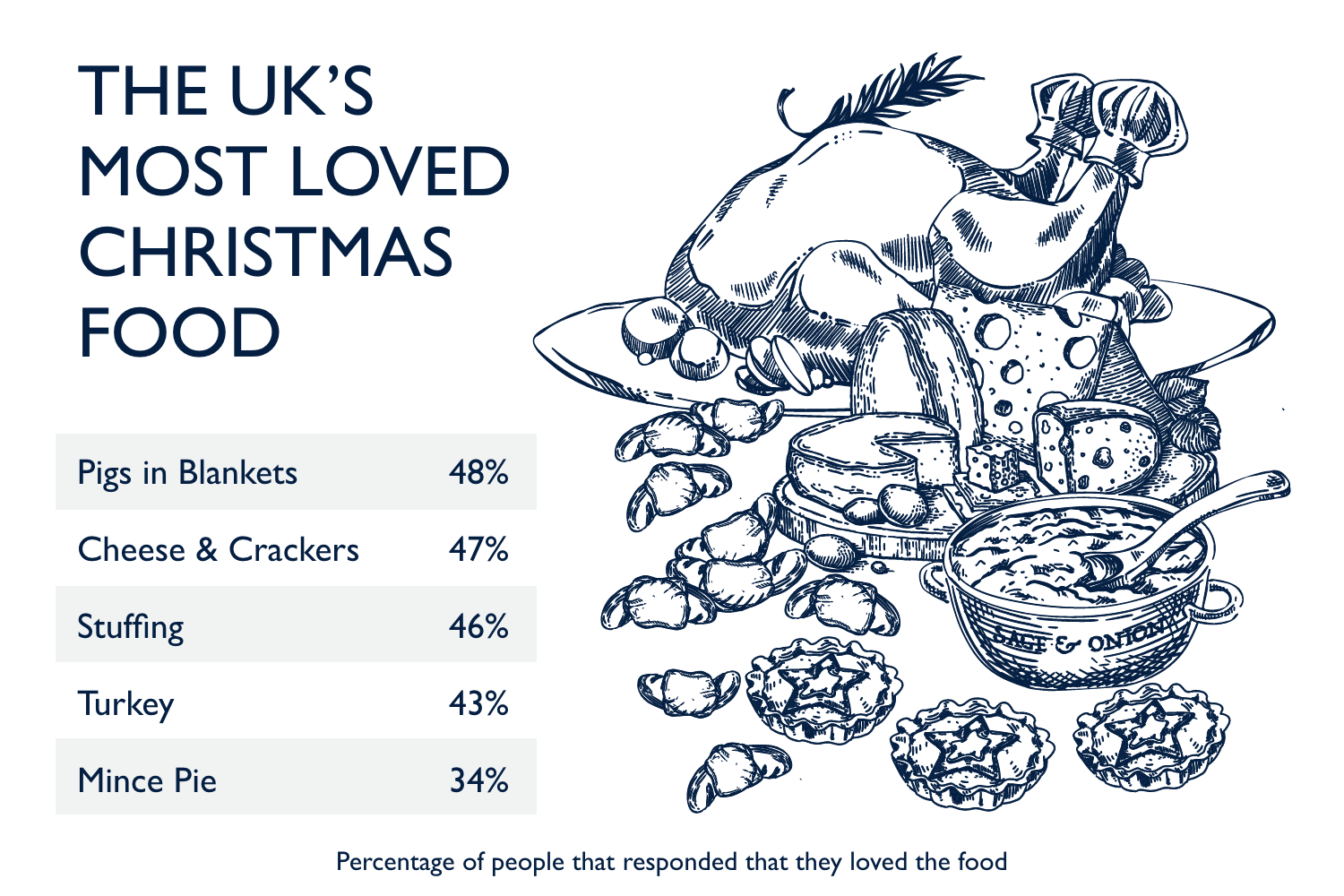
Pigs in blankets are a real crowd-pleaser at Christmas, with 48% of people saying this is their favourite festive food. Next is cheese and crackers at 47%, followed by stuffing (46%), turkey (43%) and mince pies (34%).
The best-loved festive drinks
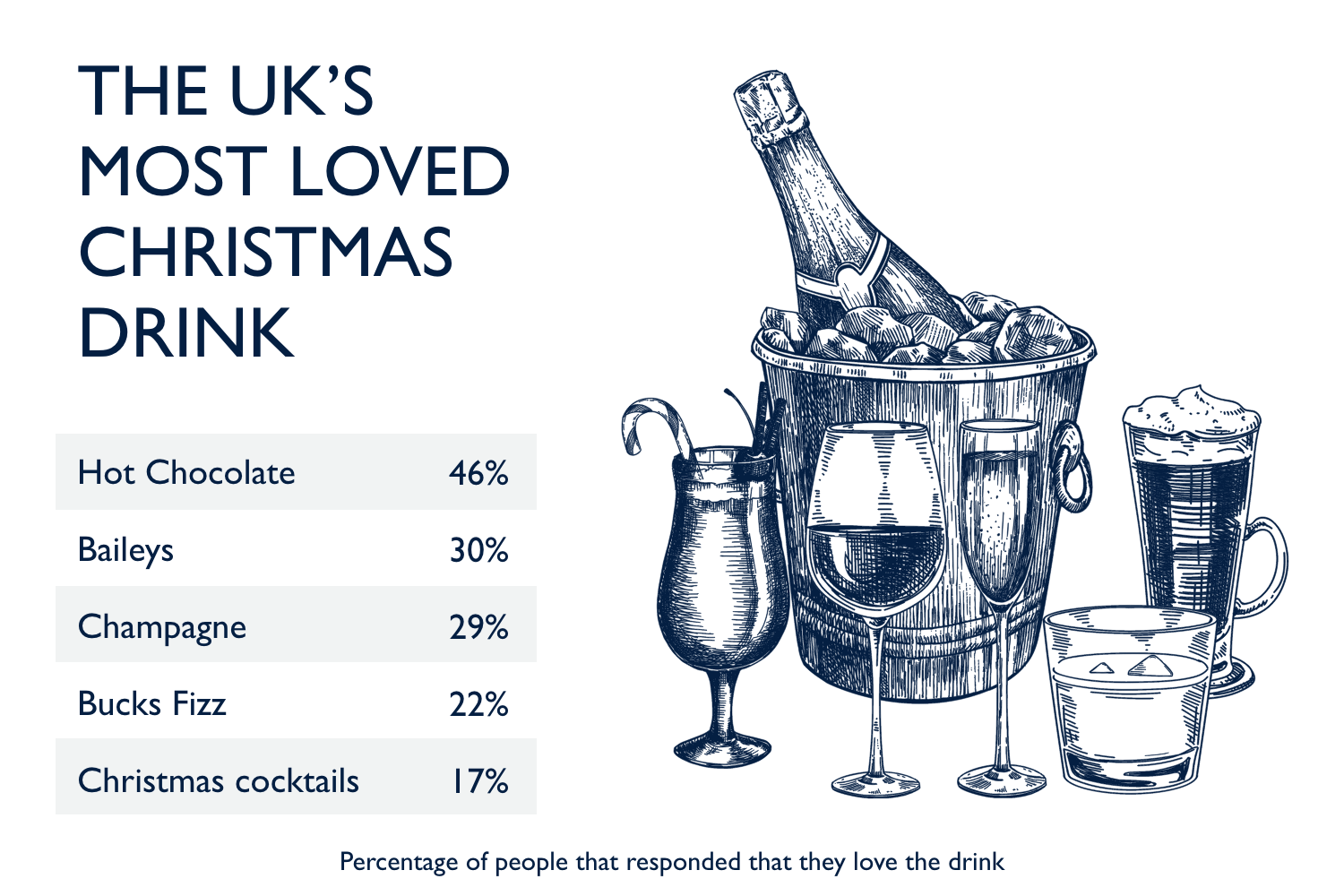
Hot chocolate is the nation’s favourite festive drink, with 46% of people voting for this winter warmer. Baileys takes second place at 30%, over champagne (29%), Buck’s Fizz (23%) and Christmas-themed cocktails (18%).
The most-disliked festive drinks
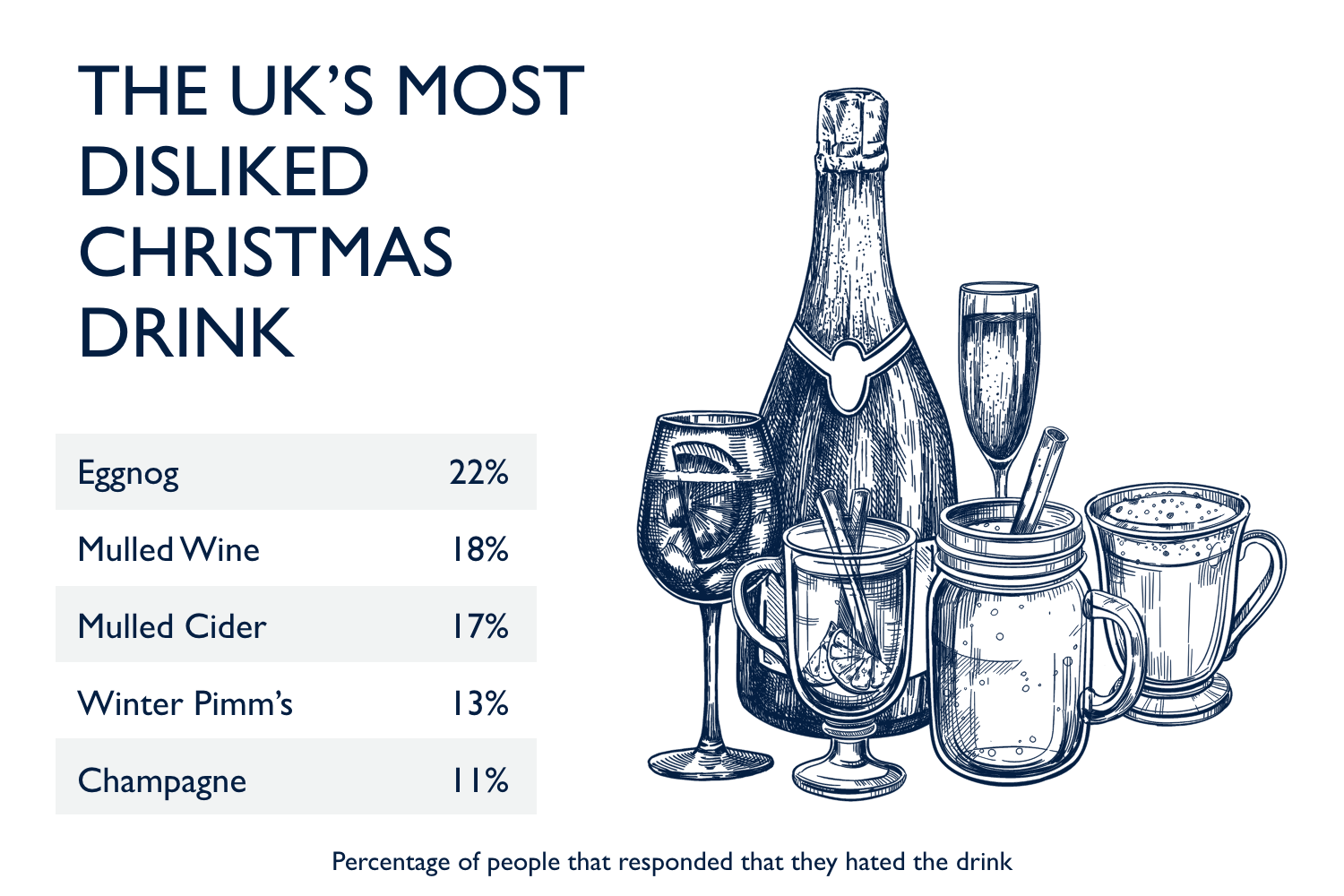
Despite being one of the most searched-for festive foods, eggnog is the nation’s least-favourite Christmas tipple. Mulled wine and mulled cider also fall into this category, with 18% of people saying this is their most disliked festive drink. Although it sits among the UK’s top three Christmas drinks, 11% say champagne is their least-favourite drink.
Interview with The Midland, a Royal Leonardo Hotel Head Chefs and Venue Director
Executive Head Chef at The Midland a Leonardo Royal Hotel, Brian Spark and Head Chef of Mount Street Dining Room Bar, Robert Owen, along with Venue Director Gillian Feast share their thoughts on the festive food trends for 2022 and how they decide which foods to include on their Christmas menus.
What foods do you expect to trend this festive season?
Brian: Christmas is a very traditional occasion. It’s family-oriented, but that’s the nostalgia of Christmas. Last year we saw a lot of trends around vegan and plant-based foods, and we will probably see more of that. But I think for us, it’s very much about tradition—turkey is always on the menu.
What are the challenges you face when crafting a festive menu?
Brian: Sticking to traditions can also be challenging. We always want to try new things and be a little different, but you have to rein yourself in a bit with Christmas, as people want tradition. If you try and mess with tradition, they’ll be less likely to go for that menu, so it’s about finding that balance.
When do you start planning your festive menu?
Brian: We usually write the menus around January and February, ready for that year. You need to be well-organised and factor in around nine months of planning.
Robert: The best time to write a festive menu is probably just after Christmas when you’re still using the season’s produce.
Do you have an external taste tester to try your Christmas menu?
Gillian: First, the chefs try the dishes to make sure they work. Then, we'll turn to other departments within the hotel, like the Food and Beverage Department. We all know what a turkey dinner tastes like, but if we’re doing something a little different for a starter, we get everyone involved.
We also like to involve the front-of-house staff because they talk to the guests and know what they’re looking for. We may think it's the best dish in the world, but when we present it to front-of-house, they have received other feedback.
Do you work with The Midland, a Leonardo Royal Hotel’s mixologists to create seasonal beverages that complement the festive menu?
Brian: This is something we are looking to do more—pairing cocktails with food.
Gillian: Moving forward, we would like our mixologists and bartenders to have more menu input. They interact with guests, and one thing guests love to do is get involved in mixology. They love watching what’s going on, like in an open kitchen. All eyes are always on the chefs because people are intrigued by the process.
Are there any dishes that appear on the festive menu every year?
Robert: The main dish is obviously turkey. We try to change the starters around more and play around with flavours for dessert. For example, we might choose a mulled wine jelly and layer it with a spiced sponge.
Brian: Pâté is also a festive favourite. You can add a little chutney and a nice slice of toast. Pickled vegetables and Kimchi are also good—like pickled cabbages with wintery spices.
At Mount Street, we cater for banqueting, so it’s often turkey dinners. But we do have a more varied menu alongside this. We always offer two different desserts: a traditional Christmas pudding and a chocolate layered cake.
What inspires you when creating a festive menu?
Brian: A lot of inspiration comes from the seasons. Coming back to what we were saying about writing the menus in January, you know what foods are available during that season.
Robert: We have the Christmas markets in Manchester, so tasting the food there inspires us for our festive menus. But then you also have part of your brain telling you to stick to traditions.
Are there any foods or dishes you predict will become more popular in the coming years?
Brian: More vegan dishes and pickled vegetables are becoming popular, which are good for gut bacteria. But I think people will stick to turkey.
How long does it take to get from a concept to a finished dish?
Brian: It depends on the type of dish. For turkey, you know what the flavours are and what works. But if it’s something a little bit different, it can take weeks of trials, adapting recipes to make it work for that dish. You then go through various cook-offs to make sure it works. So, anything from 10 minutes to three weeks.
When do you start preparing the food for the big day?
Brian:If you start on Christmas Day, you’re already too late. There's a lot of work involved. We usually begin at least two days before the Christmas Day service.
Robert: Everything needs to be ready by Christmas Eve, and then on Christmas morning, it gets cooked. Christmas Day should be one of the easiest days because everything's prepped. It’s making sure everything gets in the oven on time and is seasoned properly, ready for that 12 pm service.
How important is sourcing local produce for The Midland, a Leonardo Royal Hotel menus, and how does this influence the festive menu?
Brian: It’s hugely important to us—seasonal, local produce shapes our menus. And we're lucky to have great produce on our doorstep. We have a local butcher for turkeys and chickens and source most of our other products from Yorkshire and the Lake District.
What is the ideal dish for a Christmas breakfast?
Robert: Eggs royale washed down with a glass of champagne.
Brian: There’s a new tradition in my household: a slab of toasted brioche with some crispy pancetta, a fried duck egg and a bit of duck on top. That’s a Christmas breakfast of champions.
Manchester has many well-known, critically acclaimed restaurants. What makes you proud to represent the iconic Midland hotel?
Robert: Manchester has some lovely restaurants, and the food scene has grown hugely over the past few years and continues to do so. It feels really good to be part of it.
Brian: The Midland is an iconic hotel in the centre of Manchester, so it’s an honour to work here and to be involved in Manchester’s food scene over Christmas. There’s a nice buzz around Manchester at Christmastime.
Learn more about Christmas at The Midland, a Leonardo Royal Hotel, including hotel packages, festive afternoon tea, and their festive menu.
Methodology
- Using Google Keyword Planner, we identified search volumes over the past year and identified the most searched-for festive foods.
- Using Census Wide, we surveyed 2010 people across the UK to discover their opinions on festive foods.
